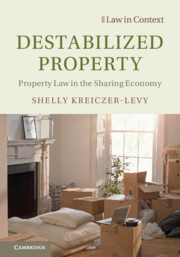Book contents
- Reviews
- Destabilized Property
- The Law in Context Series
- Destabilized Property
- Copyright page
- Dedication
- Contents
- Acknowledgments
- 1 Introduction
- 2 Stability and Property Use
- 3 The Decline of Stability in the New Millennium
- 4 The Rise of the Access Economy
- 5 Access as an Alternative to Ownership
- 6 Fragmentation of Intimate Property
- 7 Evaluating Flexibility in Property Use
- 8 What’s Next? The Future of the Access Economy
- 9 Conclusion
- Index
- Series page
5 - Access as an Alternative to Ownership
Published online by Cambridge University Press: 25 October 2019
- Reviews
- Destabilized Property
- The Law in Context Series
- Destabilized Property
- Copyright page
- Dedication
- Contents
- Acknowledgments
- 1 Introduction
- 2 Stability and Property Use
- 3 The Decline of Stability in the New Millennium
- 4 The Rise of the Access Economy
- 5 Access as an Alternative to Ownership
- 6 Fragmentation of Intimate Property
- 7 Evaluating Flexibility in Property Use
- 8 What’s Next? The Future of the Access Economy
- 9 Conclusion
- Index
- Series page
Summary
This chapter studies access, a short-term and casual use of property. Two forms of access are analyzed: independent access, and access in cooperative and communal projects. The chapter offers a normative evaluation of access and highlights the values and concerns associated with flexibility and mobility.It revisits the justifications for private property discussed in Chapter II and demonstrates that these justifications can also defend an alternative vision of flexibility and mobility. Yet there is an important twist. Instead of freedom from interference, access fosters freedom from being tied down to a particular space. Instead of personhood, access supports the ability to experiment with one’s personality and pushes the boundaries of the self. In addition, access affects communities and changes interactions with other people. Access also raises significant normative concerns, such as vulnerability to immediate changes in health or financial stability, and vulnerability to platform power. This chapter then suggests preliminary guidelines for reform that are later developed in Chapter VII, including removing barriers to access, promoting consumer protection, restraining platform power, and respecting the principles of communal access by adjusting the legal rules of cases involving the physical integrity of the property.
Keywords
- Type
- Chapter
- Information
- Destabilized PropertyProperty Law in the Sharing Economy, pp. 78 - 108Publisher: Cambridge University PressPrint publication year: 2019

